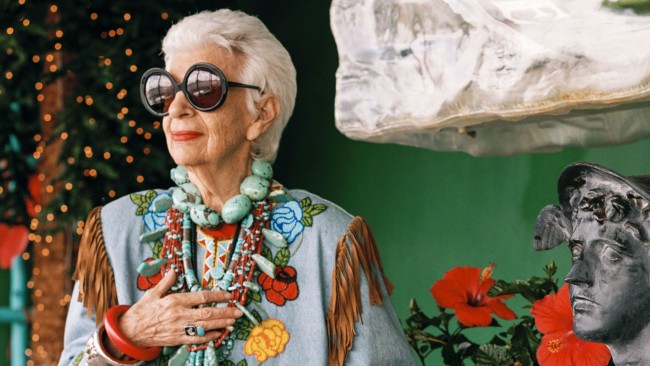When I was younger I went to some bumblefuck water park tucked away in the Pocono mountains. It was miles away from all major highways, away from eyes that might pry with an official gaze, away from the cops and all other forms of authority. I’m sure of it. You don’t hide your water park from civilization unless your water slides are held together by loose screws.
Anyway: I remember I was waiting at the bottom of a rickety slide, looking out for a family friend who promised she would meet me down below. I kept my eyes peeled. I looked up, followed the swirls and twirls, but couldn’t find her. Instead, with my lids squinted at half mast—to keep the sun from blinding my peepers out—I caught sight of one of the oldest men I’d ever seen. He was an old, old man. Barely there. Barely cognizant. (Or rather, that’s what I had assumed). The man had hair growing out of orifices I scarcely knew existed. It was like some kind of hirsute monster had infiltrated the man’s old, frail body and was now trying to crawl back out. The man was coming down like a bullet, his teeth on full display, his lips stretched as far back as possible to express the sheer giddiness he felt from careening so wildly down a slippery length of plastic.
I’m not gonna lie: I wasn’t all that impressed. Everyone else was. They were clapping, cheering, cooing and losing their minds over just how adorable this old man was. (shrug). I don’t know. I didn’t see it. To be honest with you, I wanted the old man clothed. I couldn’t face his body anymore. The deterioration. All I knew up until then was the meaty, self-assured stature of an overfed Ukrainian man. I wasn’t prepared to deal with the decay of a living body.
Jump forward some fifteen years and I’m still dealing with age-related insecurities. People murmur and talk—with the luxury of youth—about death and how unknowable it is, how unreal and of another dimension it is, how it expresses this and that, how the great Russians—Dostoevsky, Bulgakov, Pushkin, etc.—have such an intimate relationship with it. They talk about it with faux fear. (…or at least I think they do).
Although, if I’m being honest, I have trouble fearing something that may or may not actually exist. Death’s too ineffable for me to fret over. (I guess you can call it a lack of imagination). What really frightens me is the idea of losing control over my body. The idea that my knees are gonna hurt worse and worse with every passing trip to the movies. (My knees pop with all sorts of fireworks whenever I’m crushed into a narrow row for too long). Or the idea that one day I might have to feel a stranger’s hand comb through my ass with tissue-covered fingers. Or that I’ll have things to say, sentiments to share, but will no longer have the faculties required to verbalize them.
Worst of all, however, is the fear that people younger than myself will feel the compulsive need to infantilize me, just like those by-standing gawkers at that bumblefuck water park fifteen years back.
It’s a mistake to assume that people’s minds weaken as their bodies go. Obviously, there are plenty of older people who lose their minds, their cogency, their ability to connect the dots, but even then, we shouldn’t swaddle them with condescending care as we do with babies, we should still respect the fact that they’ve lived longer than us, that they’ve accomplished, failed, and built shit of their own. That they’ve lived lives worth marveling over.
This includes recently-deceased director Albert Maysles’s latest subject: Iris Apfel (as well as Maysles himself).
Iris is a fine film, a solid film, but mostly dispensable. After recently introducing myself to the Maysles with their one-two combination of Gimme Shelter and Grey Gardens—movies steeped in the gritty, grainy wash of celluloid, of rot and anarchy, of youth misused, of the body degenerated—I was disappointed with Albert Maysles’ ho-hum approach to a personality—our titular lead—who clashes so spectacularly with our culture’s vampiric obsessions with youth. Iris is the polar opposite of what gets our blood pumping. Whatever youth she once had is gone. As somebody once told her: “You’re not pretty, and you’ll never be pretty, but it doesn’t matter. You have something much better: you have style.”
Sadly, the same can’t be said for Mr. Maysles’s second-to-last film.
But that’s not the worst of it.
As I was watching the movie a series of questions kept popping into my head:
“How many people in the audience are here because of Iris’s geriatrically-peculiar rise to ‘fame’?” “Furthermore, how many of those same people consider the idea of an old, old lady cobbling together outfits of absurdity as ‘quirky’ and ‘cute’?”
Similar to the incident with the old man and his descent into the patronizing din of the chlorine-dripping peanut gallery, the audience around me gushed with the condescending affection typically reserved for cherubic toddlers when Iris—who, too, has her moments of superciliousness—gifted her husband a gold-encrusted hat that only prepubescent Kanye fans would wear. I swear, I even heard one girl whisper to her friend: “That’s soooo adorable!”
In an attempt to demonstrate Iris’s supposed relevance amongst today’s youth, our Rare Bird of Fashion brings us to a class she sometimes teaches in order to mold the young and impressionable minds of fashion. After introducing her students to a retinue of successful designers and weavers and embroiders, Iris—who’s gracious enough to carve time out of her busy schedule to connect (seemingly) vapid pissants with heavy-hitting fashionistas—is “appreciated” by being positioned and propped for an impromptu group photo reminiscent of a Disney World portrait taken with Mickey.
There’s a certain point in the film, however, when the tone shifts from the peculiar to the sobering. It’s when Iris—along with a team of curators—is sifting through her collection of rarities, her oversized bracelets, her exotic materials and coats and clerical vestments, her African tribesman cloaks, etc., that she’s asked how difficult it is to part with all these beautiful numbers, whether or not she loses sleep over it. Given the film’s intent to illustrate Iris as a perpetual motion machine, the audience thinks it already knows the answer to the interviewer’s question: Yes.
And she does. But not because of her clothes. It’s her health. Iris is poignantly aware of her bum hip, her husband’s age, the rent she pays on her loft-sized storage unit out in Long Island. And this is what young people tend to forget about old people, who they think must be living on a cloud nine of constant epiphanies and placating wisdom: their lives are significantly more urgent than ours. There’s a minute-to-minute consideration there that’s unlike anything a baby or teenager or angsty mid-20-year-old—or even a middle-aged person—have ever, or will ever, consider. And yes, yes, there are exceptions to every rule, but I would venture to say that most people my age are to concerned with twitter and facebook and their futures and past misdeeds to think of life in fragmented periods of time that may or may not end in complete nothingness.
Albert Maysles must’ve had similar ideas, or why else would all these thoughts be running through my head? This isn’t a spontaneous combustion of analysis; my reading must come from somewhere. But then again—and this isn’t the first time he’s done this—there is a moment in which Mr. Maysles includes himself in the narrative: just as photographer Bruce Weber begins to share his theory on Iris’s involvement with the movie, we reverse cut to Albert with his camera and monitor, his crooked headphones, his disheveled hair, smiling like a dope. Weber posits that Iris agreed to the project because of Albert’s adorability. She can’t help but swoon for him. Again, this is icky territory. Weber mentions Iris’s visible crush as if it were a quaint notion: for two octogenarians to still have such funny feelings.
Death’s intangible. Sure, people feel it on their way out—unless they pass in the middle of the night, cushioned in liquid dreams and fantasy—people are stabbed, shot, burned, devoured. But no one knows what comes after that final beat—if there’s anything earthly to greet us on the other end. We don’t even know whether the following world shares the same apparatus of senses as we do. But aging is tangible. People can talk about their depreciating health, their draining vitality, their bones, their joints, their hair, their plumbing. They can talk about their penny-sized bladders, their affinity for Costco-sized tubs of fiber, they can warn us of how decades of stress, terrible diets, addiction to cigarettes, and revulsion to exercise can culminate into powerlessness. But they can’t tell us what to expect after our final breath. And because these people—Albert, Iris, and her husband Carl Apfel—are souls so close to the ultimate threshold it’s interesting to watch Iris as a kind of tutorial: HOW TO POTENTIALLY STAVE OFF DEATH! These are people who GO GO GO!There’s no reason for Albert to have been filming well into his 80s. There are plenty of directors younger than him who’ve already retired—as evidenced by director John Boorman’s latest announcement. There’s also no reason for Iris to continue doling out her pieces, visiting specialized shops in Harlem, arranging storefront mannequin displays, nor is there any reason for Carl to accompany his wife to every gala, every interview, every TV show taping. They do it because it maintains the wheel. Once that wheel stops spinning, all that’s left is a feeble body—a body exposed to hipster vultures that circle, scrutinize, and search for the color in our caricatures. You stop moving and the wheel tips over and quits.
In short: old people are not mascots, so quit parading them around as if they were.






